动词短语测试选择题
高中英语动词短语单项选择题30题
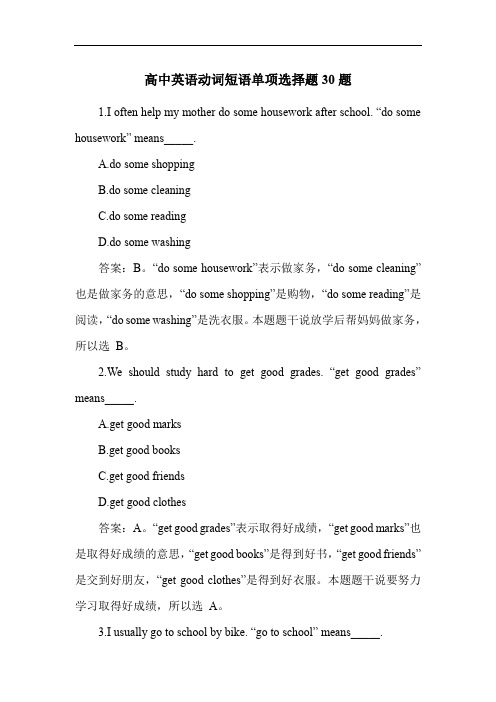
高中英语动词短语单项选择题30题1.I often help my mother do some housework after school. “do some housework” means_____.A.do some shoppingB.do some cleaningC.do some readingD.do some washing答案:B。
“do some housework”表示做家务,“do some cleaning”也是做家务的意思,“do some shopping”是购物,“do some reading”是阅读,“do some washing”是洗衣服。
本题题干说放学后帮妈妈做家务,所以选B。
2.We should study hard to get good grades. “get good grades” means_____.A.get good marksB.get good booksC.get good friendsD.get good clothes答案:A。
“get good grades”表示取得好成绩,“get good marks”也是取得好成绩的意思,“get good books”是得到好书,“get good friends”是交到好朋友,“get good clothes”是得到好衣服。
本题题干说要努力学习取得好成绩,所以选A。
3.I usually go to school by bike. “go to school” means_____.A.go to homeB.go to parkC.go to hospitalD.go to library答案:无选项正确表述应为go home(回家)、go to the park(去公园)、go to the hospital(去医院)、go to the library(去图书馆)。
英语动词短语与固定搭配选择题30道

英语动词短语与固定搭配选择题30道1.She is good at playing basketball and also ______ singing.A.likesB.is fond ofC.enjoysD.is interested in答案:B。
本题考查动词短语的辨析。
“be good at”表示擅长,“also”表示也,“be fond of”表示喜欢,最符合语境。
“likes”后面通常直接跟名词或动名词,不能与“also”搭配;“enjoys”后面也直接跟动名词,与前面“is good at”不搭配;“is interested in”表示对……感兴趣,没有“喜欢”的程度深。
2.The boy often helps his mother ______ the housework.A.withB.forC.inD.to答案:A。
“help sb with sth”是固定搭配,表示帮助某人做某事。
“for”“in”“to”与“help”和“housework”搭配不当。
3.My father is busy ______ his work.A.withB.inC.onD.at答案:A。
“be busy with sth”是固定搭配,表示忙于某事。
“in”“on”“at”与“busy”和“work”搭配不当。
4.I am looking forward ______ seeing you again.A.toB.forC.atD.in答案:A。
“look forward to doing sth”是固定搭配,表示期待做某事。
“for”“at”“in”与“look forward”和“seeing”搭配不当。
5.The teacher is very patient ______ us.A.toB.withC.forD.at答案:B。
“be patient with sb”是固定搭配,表示对某人有耐心。
高中英语动词短语单选题50题

高中英语动词短语单选题50题1. Tom is always late for school. His teacher is very angry and asks him to ______ his bad habit.A. get rid ofB. put up withC. come up withD. look forward to答案:A。
“get rid of”表示“摆脱,除去”;“put up with”意思是“忍受”;“come up with”是“想出,提出”;“look forward to”指“期待”。
在这个语境中,老师让汤姆改掉总是迟到的坏习惯,所以用“get rid of”。
2. In the sports meeting, Mary ______ very fast and won the first prize.A. ran offB. gave awayC. showed offD. passed away答案:A。
“ran off”有“跑掉,逃跑”的意思,这里表示“跑得很快”;“gave away”是“赠送,分发”;“showed off”意为“炫耀”;“passed away”是“去世”。
根据语境,是说玛丽跑得很快,用“ran off”。
3. The students are busy ______ for the final exam.A. preparingB. caringC. waitingD. looking答案:A。
“prepare for”表示“为......做准备”;“care for”有“关心,照顾”的意思;“wait for”是“等待”;“look for”指“寻找”。
学生们为期末考试忙碌准备,用“preparing for”。
4. We should ______ the old and offer our seats to them on the bus.A. look afterB. listen toC. depend onD. laugh at答案:A。
短语动词练习题

短语动词练习题一、短语动词的定义和类型短语动词是由动词加上一个或多个小品词(如介词、副词)构成的固定搭配,其意义往往不能从单个单词的意思简单推导出来。
常见的类型包括动词+介词、动词+副词、动词+副词+介词等。
例如,“look after”(照顾)是动词+介词的类型;“put on”(穿上)属于动词+副词;“put up with”(忍受)则是动词+副词+介词。
二、练习题目(一)选择题1、 Please ______ your coat It's cold outsideA put onB put offC put awayD put up2、 The little boy is trying to ______ his fearA get overB get awayC get offD get out3、 We need to ______ some money for our tripA put asideB put downC put upD put in(二)填空题1、 She always ______ (turn off) the lights before leaving the room2、 They decided to ______ (give up) smoking3、 I'll ______ (look for) my keys(三)翻译题1、你应该照顾好自己。
(look after)2、他终于克服了困难。
(get over)3、请把书收起来。
(put away)三、解题思路和技巧(一)理解语境在做选择题和填空题时,首先要仔细阅读题目,理解句子所表达的语境和含义。
通过上下文来判断需要哪个短语动词才能使句子通顺、合理。
例如,在第一题中,“It's cold outside”表明需要穿上外套来保暖,所以应该选择“put on”。
(二)掌握常见短语动词的意义和用法对于常见的短语动词,要牢记它们的意义和用法。
中考英语动词短语搭配单选题30题

中考英语动词短语搭配单选题30题1. My sister is good at ______ stories.A. tellingB. sayingC. speakingD. talking答案:A。
“tell stories”表示“讲故事”,是固定搭配;“say”侧重于说的内容;“speak”常指说某种语言;“talk”强调交谈。
2. We should stop ______ plastic bags.A. to useB. usingC. useD. used答案:B。
“stop doing sth.”表示“停止做某事”,“stop to do sth.”表示“停下来去做某事”。
这里是停止使用塑料袋,用“using”。
3. Please remember ______ your homework to school tomorrow.A. to bringB. bringingC. bringD. brought答案:A。
“remember to do sth.”表示“记得去做某事( 还没做)”,“remember doing sth.”表示“记得做过某事”。
这里是记得明天把作业带来学校,还没做,用“to bring”。
4. The teacher made us ______ English exercises all the time.A. doB. to doC. doingD. did答案:A。
“make sb. do sth.”是固定用法,“使某人做某事”,用动词原形“do”。
5. I'm looking forward to ______ you again.A. seeB. seeingC. sawD. seen答案:B。
“look forward to doing sth.”表示“期待做某事”,to 是介词,后接动词-ing 形式。
6. Tom is very busy with his work. He ______ late every night.A. stays upB. looks upC. turns upD. gives up答案:A。
英语动词短语选择题40道
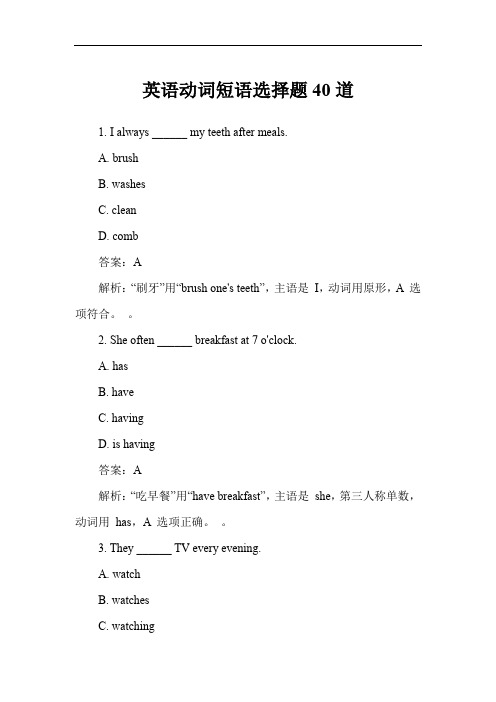
英语动词短语选择题40道1. I always ______ my teeth after meals.A. brushB. washesC. cleanD. comb答案:A解析:“刷牙”用“brush one's teeth”,主语是I,动词用原形,A 选项符合。
2. She often ______ breakfast at 7 o'clock.A. hasB. haveC. havingD. is having答案:A解析:“吃早餐”用“have breakfast”,主语是she,第三人称单数,动词用has,A 选项正确。
3. They ______ TV every evening.A. watchB. watchesC. watchingD. are watching答案:A解析:“看电视”用“watch TV”,主语是they,动词用原形,A 选项符合。
4. He ______ a letter to his friend last night.A. writesB. wroteC. writingD. is writing答案:B解析:“昨晚”表明是过去时,“写”用“write”,过去式是wrote,B 选项正确。
5. My mother ______ the clothes every day.A. washesB. washC. washingD. is washing答案:A解析:“洗衣服”用“wash the clothes”,主语是my mother,第三人称单数,动词用washes,A 选项正确。
6. He was ______ a lot of pressure at work.A. underB. inC. onD. with答案:A。
“under pressure”是“处于压力之下”的固定短语。
7. She always ______ hard to meet the deadlines.A. worksB. works onC. works outD. works at答案:A。
高二英语动词短语辨析选择单选题30题

高二英语动词短语辨析选择单选题30题1. I was really tired and stopped ______ a rest.A. havingB. to haveC. haveD. had答案:B。
本题考查stop 的用法。
stop to do sth. 表示“停下来去做某事”,stop doing sth. 表示“停止正在做的事”。
本题中“我很累停下来去休息”,应用stop to have a rest。
A 选项having 用于stop doing sth. 结构,不符合语境;C 选项have 是动词原形,不符合stop 的用法;D 选项had 是过去式,也不符合stop 的用法。
2. We should keep ______ English every day.A. to practice speakingB. practicing to speakC. practicing speakingD. to practice to speak答案:C。
keep doing sth. 表示“持续做某事”,practice doing sth. 表示“练习做某事”。
A 选项to practice speaking 中keep 后应接doing 形式;B 选项practicing to speak 中practice 后应接doing 形式;D 选项to practice to speak 两个用法均错误。
3. The little girl is afraid ______ out at night.A. to goB. goingC. goesD. go答案:A。
be afraid to do sth. 表示“害怕做某事”,be afraid of doing sth. 表示“担心某事发生”。
本题是“小女孩害怕晚上出去”,用be afraid to go out。
B 选项going 用于be afraid of doing sth. 结构,不符合题意;C 选项goes 是第三人称单数形式,不符合be afraid 的用法;D 选项go 是动词原形,也不符合。
高中英语动词短语单选题50题
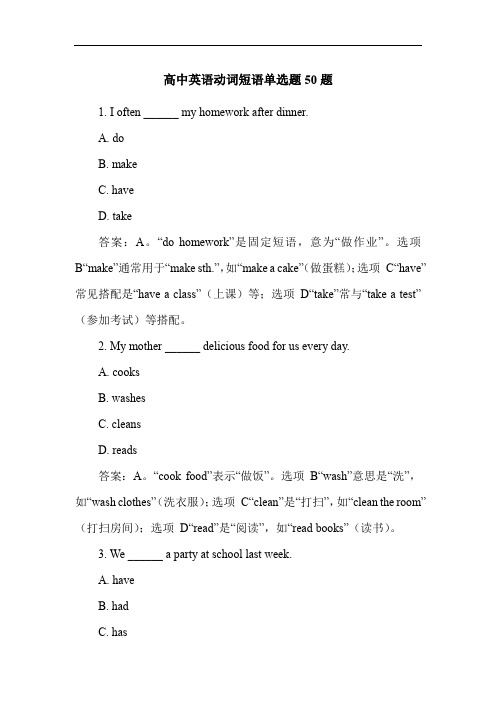
高中英语动词短语单选题50题1. I often ______ my homework after dinner.A. doB. makeC. haveD. take答案:A。
“do homework”是固定短语,意为“做作业”。
选项B“make”通常用于“make sth.”,如“make a cake”( 做蛋糕);选项C“have”常见搭配是“have a class” 上课)等;选项D“take”常与“take a test” 参加考试)等搭配。
2. My mother ______ delicious food for us every day.A. cooksB. washesC. cleansD. reads答案:A。
“cook food”表示“做饭”。
选项B“wash”意思是“洗”,如“wash clothes”( 洗衣服);选项C“clean”是“打扫”,如“clean the room” 打扫房间);选项D“read”是“阅读”,如“read books” 读书)。
3. We ______ a party at school last week.A. haveB. hadC. hasD. having答案:B。
“last week”是过去时间,要用一般过去时,“have”的过去式是“had”。
选项A 是一般现在时;选项C 是第三人称单数形式;选项D 是现在分词形式。
4. My father ______ TV in the living room now.A. watchesB. is watchingC. watchD. watched答案:B。
“now”表明是现在进行时,其结构是“be + 动词现在分词”,“watch”的现在分词是“watching”。
选项 A 是一般现在时;选项C 是动词原形;选项D 是一般过去时。
5. The students ______ football on the playground at the moment.A. playB. are playingC. playsD. played答案:B。
中考英语动词短语搭配单选题40题

中考英语动词短语搭配单选题40题1. My mother is busy ______ the room.A. cleanB. cleaningC. to cleanD. cleans答案:B。
本题考查“be busy doing sth.”的用法,表示“忙于做某事”,所以应该用动词的-ing 形式,A 是动词原形,C 是动词不定式,D 是动词的第三人称单数形式,均不符合该短语搭配,故选B。
2. The children are good ______ English.A. inB. forC. atD. with答案:C。
“be good at”表示“擅长”,A 选项“in”通常用于“in + 地点”等短语,B 选项“for”表示“为了;对于”,D 选项“with”表示“和……一起;具有”,都不符合“擅长”的意思,所以选C。
3. Please stop ______. It's time for class.A. talkB. talkingC. to talkD. talks答案:B。
“stop doing sth.”表示“停止正在做的事”,“stop to do sth.”表示“停下来去做另一件事”,这里是说上课了,要停止说话,是停止正在进行的动作,A 是动词原形,D 是动词的第三人称单数形式,均不符合,故选B。
4. I'm looking forward ______ you again.A. seeB. seeingC. to seeD. to seeing答案:D。
“look forward to doing sth.”表示“期待做某事”,这里to 是介词,其后接动词-ing 形式,A 是动词原形,C 是动词不定式,不符合短语搭配,故选D。
5. We should take care ______ our parents when they are old.A. ofB. forC. withD. to答案:A。
高中英语动词短语单项选择题30题

高中英语动词短语单项选择题30题1. Mary often ______ her notes before the exam.A. looks upB. looks throughC. looks afterD. looks for答案:B。
本题考查动词短语的用法。
“look up”意为“查阅;查找”;“look through”表示“浏览;仔细查看”;“look after”意思是“照顾;照看”;“look for”是“寻找”。
在这个语境中,玛丽在考试前通常会仔细查看她的笔记,所以用“looks through”。
2. The teacher asked us to ______ the new words in the dictionary.A. put upB. give upC. look upD. take up答案:C。
“put up”有“张贴;搭建”的意思;“give up”是“放弃”;“look up”在此处指“在词典中查找”;“take up”意为“开始从事;占据”。
老师让我们在词典中查找新单词,用“look up”。
3. Tom always ______ late for school.A. gets upB. gets onC. gets offD. gets答案:A。
“gets up”表示“起床”;“gets on”意为“上车”;“gets off”是“下车”。
汤姆总是起床晚所以上学迟到,用“gets up”。
4. We should ______ our classroom every day.A. clean upB. put upC. make upD. turn up答案:A。
“clean up”指“打扫干净”;“put up”是“张贴;搭建”;“make up”有“组成;编造”的意思;“turn up”意为“出现;调大”。
我们应该每天打扫教室,用“clean up”。
动词短语练习题

动词短语练习题一、选择题1. The teacher asked the students to _______ their homework before class.A. hand inB. hand outC. hand overD. hand up2. He _______ the old chair and replaced it with a new one.A. broke downB. broke offC. broke throughD. broke up3. The athlete _______ the finish line and won the race.A. crossedA. passedC. went overD. went under4. She _______ the bookshelf and found an old photo album.A. looked throughB. looked upC. looked downD. looked after5. The company _______ the new policy after a series ofdiscussions.A. put forwardB. put offC. put awayD. put on二、填空题6. The manager _______ the meeting to discuss the new project. (推迟)7. The children _______ the kite into the sky. (放飞)8. The scientist _______ the experiment with great success. (完成)9. The artist _______ the painting with a few final touches. (修饰)10. The politician _______ the speech with a powerful conclusion. (结束)三、改错题11. The boy handed the ball to his friend. (将"handed"改为正确的动词短语)12. She looked the word in the dictionary. (将"looked"改为正确的动词短语)13. The company broke the new product to the market. (将"broke"改为正确的动词短语)14. The athlete crossed the finish line and won the race. (将"crossed"改为正确的动词短语)15. The teacher handed out the test papers to the students. (将"handed out"改为正确的动词短语)四、翻译题16. 他们决定放弃这个计划。
高中英语动词短语单选题50题
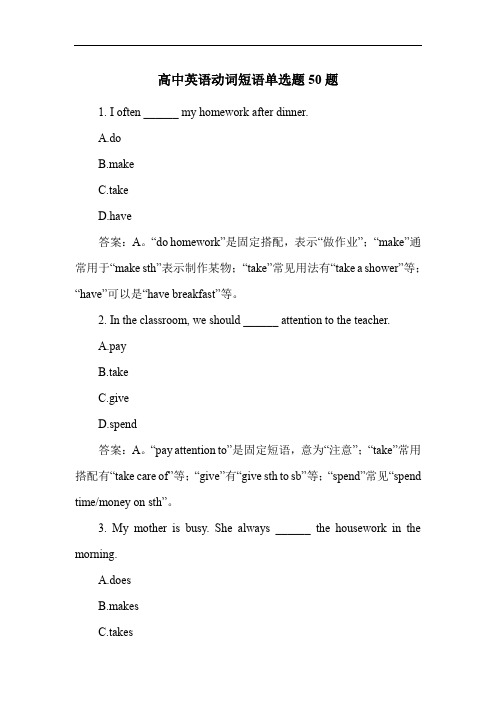
高中英语动词短语单选题50题1. I often ______ my homework after dinner.A.doB.makeC.takeD.have答案:A。
“do homework”是固定搭配,表示“做作业”;“make”通常用于“make sth”表示制作某物;“take”常见用法有“take a shower”等;“have”可以是“have breakfast”等。
2. In the classroom, we should ______ attention to the teacher.A.payB.takeC.giveD.spend答案:A。
“pay attention to”是固定短语,意为“注意”;“take”常用搭配有“take care of”等;“give”有“give sth to sb”等;“spend”常见“spend time/money on sth”。
3. My mother is busy. She always ______ the housework in the morning.A.doesB.makesC.takesD.has答案:A。
“do housework”表示“做家务”;“make”可用于“make a cake”等;“take”有“take a walk”等;“have”可以是“have a meeting”等。
4. When I get up in the morning, I ______ my bed first.A.makeB.doC.takeD.have答案:A。
“make one's bed”是固定表达,意为“整理床铺”;“do”常用“do exercise”等;“take”有“take a bus”等;“have”可用于“have a cold”等。
5. We should ______ good care of our books.A.takeB.giveC.doD.have答案:A。
英语动词短语与固定搭配选择题30道

英语动词短语与固定搭配选择题30道1. I always ______ early in the morning.A. get upB. get onC. get offD. get in答案:A解析:“get up”表示“起床”,符合“early in the morning”的语境。
2. She likes to ______ books in her free time.A. look atB. look forC. readD. watch答案:C解析:“read books”表示“读书”,是固定搭配。
3. We often ______ TV in the evening.A. seeB. lookC. watchD. read答案:C解析:“watch TV”是“看电视”的常用表达。
4. He ______ his homework after school.A. doesB. makesC. hasD. takes答案:A解析:“do one's homework”表示“做作业” 。
5. They ______ football on the playground every day.A. playB. playsC. are playingD. played答案:A解析:“every day”表明是一般现在时,主语是“They”,动词用原形。
6. 在工作中,我们经常说“加班”,英语应该是:A. work overB. work extraC. work overtime 答案:C 解析:“work overtime”是“加班”的常用表达。
7. 当我们说“努力学习”,可以用以下哪个短语:A. study hardlyB. study hardC. hard study 答案:B 解析:“study hard”表示“努力学习”,“hardly”表示“几乎不” 。
8. “交作业”用英语表达是:A. hand in homeworkB. hand out homeworkC. hand on homework 答案:A 解析:“hand in”有“上交”的意思,“hand out”是“分发” 。
中考英语动词短语搭配单选题40题

中考英语动词短语搭配单选题40题1. My sister is good at ________ stories.A. tellingB. speakingC. sayingD. talking答案:A。
telling stories 是固定搭配,表示“讲故事”。
speaking 侧重于说某种语言;saying 强调说的内容;talking 侧重于交流、交谈,与stories 搭配不当。
2. We have a lot of ________ to do every day.A. homeworksB. homeworkC. houseworksD. housework答案:D。
homework 和housework 都是不可数名词,没有复数形式,A、C 选项错误。
homework 指“家庭作业”,housework 指“家务”,根据句意每天要做很多家务,故选D。
3. The teacher is angry with Tom because he often ________ in class.A. makes a faceB. makes facesC. makes friendsD. makes trouble答案:D。
makes trouble 表示“制造麻烦”;makes a face 和makes faces 都表示“做鬼脸”;makes friends 表示“交朋友”,根据句意老师生气是因为他经常制造麻烦,故选D。
4. My mother likes ________ flowers in the garden.A. growingB. plantingC. wateringD. looking after答案:B。
plant flowers 表示“种花”;grow 强调生长的过程;water 是浇水;look after 是照顾,综合句意妈妈喜欢在花园里种花,B 选项更合适。
5. We should ________ our teeth twice a day.A. brushB. cleanC. washD. make答案:A。
高考英语短语动词用法单选题30题

高考英语短语动词用法单选题30题1. I often ____ my notes before exams.A.look upB.look throughC.look forD.look after答案:B。
“look through”表示“浏览、温习”,在考试前经常会温习笔记。
“look up”是“查找、向上看”;“look for”是“寻找”;“look after”是“照顾”。
在这个语境中,只有“look through”符合在考试前的动作。
2. We should ____ our mistakes and learn from them.A.point outB.put outC.give outD.take out答案:A。
“point out”表示“指出”,我们应该指出错误并从中学习。
“put out”是“扑灭、熄灭”;“give out”是“分发、发出”;“take out”是“取出、拿出”。
这里只有“point out”符合语境。
3. The teacher asked us to ____ our answers carefully.A.check outB.try outC.work outD.turn out答案:A。
“check out”表示“检查、核对”,老师让我们仔细检查答案。
“try out”是“试验、试用”;“work out”是“解决、算出”;“turn out”是“结果是、生产”。
这个语境中“check out”最合适。
4. I need to ____ my English grammar before the final exam.A.pick upB.put upC.make upD.take up答案:A。
“pick up”在这里表示“提高、改善”,在期末考试前我需要提高我的英语语法。
“put up”是“张贴、搭建”;“make up”是“组成、编造”;“take up”是“占据、开始从事”。
英语动词短语与固定搭配选择题30道
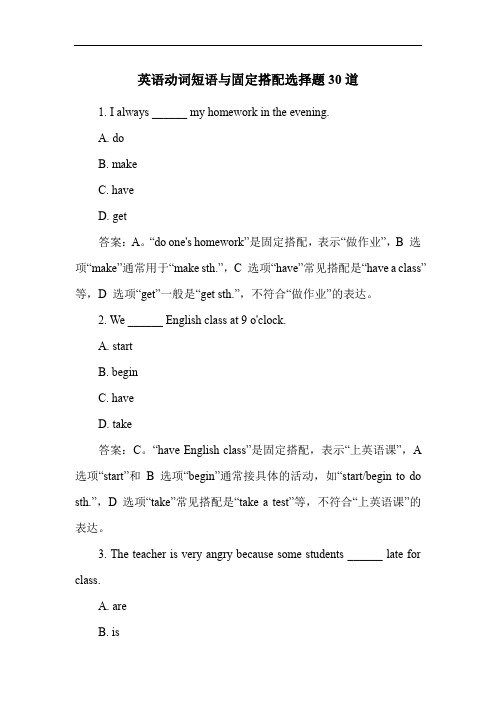
英语动词短语与固定搭配选择题30道1. I always ______ my homework in the evening.A. doB. makeC. haveD. get答案:A。
“do one's homework”是固定搭配,表示“做作业”,B 选项“make”通常用于“make sth.”,C 选项“have”常见搭配是“have a class”等,D 选项“get”一般是“get sth.”,不符合“做作业”的表达。
2. We ______ English class at 9 o'clock.A. startB. beginC. haveD. take答案:C。
“have English class”是固定搭配,表示“上英语课”,A 选项“start”和 B 选项“begin”通常接具体的活动,如“start/begin to do sth.”,D 选项“take”常见搭配是“take a test”等,不符合“上英语课”的表达。
3. The teacher is very angry because some students ______ late for class.A. areB. isC. doD. does答案:A。
“be late for”是固定搭配,表示“迟到”,students 是复数,所以用are,C 选项“do”和 D 选项“does”通常用于实义动词的否定或疑问形式,不符合题意。
4. We ______ books in the library after school.A. readB. lookC. seeD. watch答案:A。
“read books”是固定搭配,表示“读书”,B 选项“look”通常与at 连用,C 选项“see”强调看到的结果,D 选项“watch”一般用于“watch TV/film”等,不符合“读书”的表达。
中考英语动词短语单选题60题

中考英语动词短语单选题60题1.She often helps her mother_____the housework.A.withB.inC.onD.for答案:A。
“help sb with sth”是固定搭配,表示“帮助某人做某事”。
选项B“in”、选项C“on”和选项D“for”都不能和“help”及“the housework”这样搭配。
2.My father is busy_____his work.A.withB.inC.onD.at答案:A。
“be busy with sth”表示“忙于某事”。
“in”“on”“at”不能与“be busy”和“his work”这样搭配。
3.The children are interested_____painting.A.inB.onC.atD.for答案:A。
“be interested in”是固定搭配,表示“对……感兴趣”。
其他三个选项不能和“be interested”以及“painting”这样搭配。
4.Please be careful_____your things.A.withB.inC.onD.for答案:A。
“be careful with”表示“小心……;对……细心”。
“in”“on”“for”不能和“be careful”及“your things”这样搭配。
5.We should listen_____the teacher carefully in class.A.toB.forC.atD.with答案:A。
“listen to”表示“听……”。
“for”“at”“with”不能和“listen”及“the teacher”这样搭配。
6.She is always late for class. Her teacher often asks her to _____ being late.A.give upB.look upC.put upD.stay up答案:A。
中考动词短语单选题60题

中考动词短语单选题60题1. After school, I often help my mother ____ the housework.A. doB. doesC. doingD. to doing答案:A。
本题考查动词短语“help sb. do sth.”,意思是“帮助某人做某事”,所以要用动词原形,B 选项是第三人称单数形式,C 选项“doing”形式错误,D 选项“to doing”不存在这种用法。
2. My sister is good at ____ the piano.A. playB. playsC. playingD. to play答案:C。
“be good at”意思是“擅长”,其后接动词的-ing 形式,A 选项是动词原形,B 选项是第三人称单数形式,D 选项“to play”不符合该短语的用法。
3. Don't forget ____ your homework to school tomorrow.A. bringB. to bringC. bringingD. brings答案:B。
“forget to do sth.”表示“忘记去做某事( 还没做)”,“forget doing sth.”表示“忘记做过某事”,本题是明天不要忘记把作业带来学校,还没做,所以用“to bring”,A 选项“bring”形式错误,C 选项“bringing”不符合题意,D 选项“brings”是第三人称单数形式,也不正确。
4. We should stop ____ noise in the library.A. makeB. to makeC. makingD. makes答案:C。
“stop doing sth.”表示“停止正在做的事”,“stop to do sth.”表示“停下来去做另一件事”,在图书馆应该停止制造噪音,是停止正在做的事,所以用“making”,A 选项“make”是动词原形,B 选项“to make”不符合,D 选项“makes”是第三人称单数形式,也不对。
四年级动词短语选择题40题

四年级动词短语选择题40题1. We often ______ in the playground after class.A. play footballB. play the footballC. plays footballD. playing football答案:A。
“play football”是固定短语,“play + 球类运动”中间不加冠词,且主语是“we”,不是第三人称单数,不用“plays”,“playing”不能单独作谓语,所以选A。
2. The teacher always ______ us stories in class.A. tellsB. tellC. tellingD. to tell答案:A。
“tell stories”是固定短语,意为“讲故事”,主语“the teacher”是第三人称单数,所以谓语动词用“tells”,B 选项“tell”用于主语是非第三人称单数的情况,C 选项“telling”不能单独作谓语,D 选项“to tell”是动词不定式,不能作谓语,故选A。
3. My classmates ______ their homework carefully.A. doB. doesC. doing答案:A。
“do homework”是固定短语,“my classmates”是复数,所以用“do”,B 选项“does”用于第三人称单数,C 选项“doing”不能单独作谓语,D 选项“to do”是动词不定式,不能作谓语,故选A。
4. I ______ to school by bike every day.A. goB. goesC. goingD. to go答案:A。
“go to school”是固定短语,“I”是第一人称,用“go”,B 选项“goes”用于第三人称单数,C 选项“going”不能单独作谓语,D 选项“to go”是动词不定式,不能作谓语,所以选A。
三年级英语短语动词单选题40题

三年级英语短语动词单选题40题1. I want to go ______ a picnic.A. forB. toC. inD. at答案:A。
本题考查短语“go for a picnic”( 去野餐)的用法。
选项B“to”通常表示“到……去”;选项C“in”用于表示在某个范围或空间内;选项D“at”用于表示在某个具体的地点或时间点。
“go for a picnic”是固定短语,所以选A。
2. Please come ______ my home.A. toB. atC. inD. on答案:A。
此题考查“come to”( 到……来)这个短语。
选项B“at”一般用于较小的地点;选项C“in”表示在……里面;选项D“on”表示在……上面。
“come to + 地点”表示到某个地方来,所以选A。
3. Let's go ______ the park.A. toB. inC. at答案:A。
本题考查“go to” 去……)的用法。
“go to + 地点”表示去某个地方,选项B“in”强调在……里面;选项C“at”用于小地点;选项D“for”表示目的或原因。
所以答案是A。
4. They come ______ school by bus.A. toB. atC. fromD. in答案:A。
“come to school”是“来学校”的常用表达。
选项B“at”不用于此;选项C“from”表示“从……”;选项D“in”不符合此语境。
因此选A。
5. I often go ______ with my friends.A. swimB. swimmingC. to swimD. swims答案:B。
“go swimming”是固定短语“去游泳”。
选项A 形式错误;选项C“to swim”一般不这样搭配;选项D“swims”是第三人称单数形式,主语是I 时不正确。
所以选B。
6. The boy is very happy. He gets a new toy. The meaning of "gets" here is _____.B. buysC. receivesD. finds答案:C。
- 1、下载文档前请自行甄别文档内容的完整性,平台不提供额外的编辑、内容补充、找答案等附加服务。
- 2、"仅部分预览"的文档,不可在线预览部分如存在完整性等问题,可反馈申请退款(可完整预览的文档不适用该条件!)。
- 3、如文档侵犯您的权益,请联系客服反馈,我们会尽快为您处理(人工客服工作时间:9:00-18:30)。
1. —A new book on how to lose weight is _______soon.—Really? I can’t wait to read it.A. giving outB. coming outC. working outD. selling out2. —Are you going to Tibet for vacation?—Y es. I want you to ________ me with some information about it.A. offerB. giveC. showD. provide3. —Do you know Tsering Danzhou, a Tibetan ten-year-old boy in Y ushu?—Y es. He ______the people his great help as a translator after the earthquake.A. providedB. supportedC. offeredD. afforded4. Bill doesn’t like the sunglasses in the ad because they can’t _______the sun well.A. take outB. keep outC. clean outD. look out5. —Angela, you are going to buy a flat here, are you?--Y es, but I can’t ________an expensive o ne.A. spendB. costC. payD. afford6. If you see any litter on the school playground, you’d better______.A. give it awayB. pick it upC. turn it offD. put it on7. David _____ his friend’s invitation to the picnic in order t o stay at home and have a good rest.A. acceptedB. refusedC. received8. –How about the exhibition that day?--It was very noisy, but that didn’t ________ me.A. hurtB. impressC. changeD. bother9. It was a difficult time, but we never ________ hope.A. put upB. gave upC. picked upD. used up10. The famous writer introduced us his new book that will _____ next mothA. give outB. come outC. put out11. —The box is too heavy to carry. What’s in it? —Oh, it______ books.A. is filled withB. is used forC. is aimed at12. –Why don’t you choose the red tie?--For me, it doesn’t _________ my shirt very w ell.A. fixB. acceptC. compareD. match13. Y ou’ve given me so much help. I really _______ it.A. appreciateB. receiveC. supposeD. regard14. Rebuilding in Y ushu began soon alter the earthquake, and it will long into the future.A. reachB. keepC. stopD. last15. Karin found some waste paper on the floor.She it and threw into the future.A. put; upB. picked upC. turned; upD. looked up16. —Peter, what if your parents go out? —They ask me to _______ myself.A. look afterB. look upC. look forD. look through17. Mike his computer and checked his e-mail.A. turned onB. turned offC. turned upD. turned down18. —My spoken English is poor, what shall I do?—Join an English language club to practice, you’ll ________ it?A. be good atB. drop inC. deal with19. It is a good habit to _____ all your things in correct places.A. put awayB. put upC. put outD. put off20. We are all looking forward to ______more than HK $6,500 for the Oxfarm.A. raiseB. raisingC. be raisedD. being raised21. —Can you tell me the English meaning of the word?--Why don’t you _______in the dictionary?A. look it upB. ring it upC. pick it up22. She saw some boys ______soccer on the playground when she was on the way to the classroom.A. playedB. to playC. playing23. World Expo 2010 Shanghai China ________ people from all over the world to the theme ―Better City, Better Life.‖A. attendsB. attractsC. allowsD. advises24. —Many students don’t know how to ______ stress and become worried.--I think they’d better ask their teachers for help.A. argue withB. deal withC. quarrel withD. come up with25. They would rather _______ colours like orange or yellow than blue or white.A. useB. to useC. usingD. uses26. Richard turned off the computer after he had finished _______the email.A. writeB. to writeC. writingD. wrote27. Before going to the History Museum, our teacher told us _______ the public rules.A. obeyB. to obeyC. obeyingD. obeyed28. The bus is coming. Be careful when you _____the bus.A. get onB. get offC. get upD. get to29. It’s too bright and sunny. Why not _____your sun glasses?A. breakB. cleanC. makeD. wear30. Hi, Jack. Would you please _________ the picture on the wall?A. pick upB. look upC. get upD. put up31. —Why not go on a vacation with us?--I can’t _______to take the trip because I put all my money into my company.A. preferB. impressC. achieveD. afford32. —A single room, please.--OK. Will you please _________me your ID card?--Here you are.A. tellB. serveC. sendD. show33. Don’t ________the light, I _______ a report.A. turned off; have readB. turn off; am readingC. turned on; have readD. turned on; am reading34. —I find it too difficult to learn English well. I want to drop it.A. give up itB. give it upC. give away itD. give it away35. The Red Cross _______the homeless in Y ushu _______food and tents(帐篷.)A. regarded; asB. offered; forC. divided; intoD. provided; with36. Kelly’s grandpa is ill, she must ______him at h ome.A. look afterB. look upC. look outD. look for37. Enough sleep is good for health. If you ____________ for your favorite TV programs. Y ouwill feel sleepy.A. stay upB. set upC. pick up38. —My father has decided to ______ smoking.--That's good news for us.A. give upB. give outC. give inD. give to39. I’m sorry, I didn’t _______ you clearly. Would you say it again?A. hearB. noticeC. seeD. watch40. He never ________ no matter how many difficulties he has.A. gives upB. gives inC. works outD. goes away41. —Fangfang failed in the singing competition. She must be very sad. --Let’s go and_____.A. wake her upB. cheer her upC. pick her up42. Another new fiction by HanHan is being printed and it will soon .A. come outB. set outC. sell outD. work out43. It is said that the football match may be ________ because of the bad weather.A. put upB. put downC. put offD. put away44. Whether I’ll go to Shanghai ________ the result of the examination.A. belongs toB. cares aboutC. depends onD. Aims at45. I want to have a comput er, but I can’t _______ to buy one.A. offerB. provideC. considerD. afford46. -Could you please ______ my goldfish while I’ m away?-It’s my pleasure.A. look afterB. look forC. look at47. The plan isn’t perfect, so we should _________ and make a new one.A. give up itB. give it upC. give out itD. give it out48. —William , please remember to _________ the photo taken in Canada here when you come to school tomorrow . I’d like to have a look.—OK. I’ll introduce something about it to you myself.A. takeB. passC. bringD. carry49. —Do you know how to pronounce this word ?—Y es, I _______ in the dictionary yesterday.A. looked it upB. worked it outC. gave it awayD. picked it up50. —What volunteer work would you like to do?—I’d like to sick people in the hospital.A. turn upB. stay upC. look upD. cheer up51. —Excuse me, when will the train K307 arrive?--Wait a minute, please. I’ll ________it for you.A. keepB. checkC. read52. —It is very kind of you to ________my grandpa when I went to Fuzhou on business.--It’s a pleasure.A. look afterB. play tricks onC. depend on53. —Tony, I’m too nervous to give a speech in the graduation ceremony.--______! I believe you can do it!A. Be carefulB. Never mindC. Take it easy54. —What can I do for you?--I’m looking at that dress. It looks nice, May I _________?A. hold it onB. try it onC. take if offD. get it off55. —Y our watch is so beautiful. It must be expensive.—Not at all. I only ¥20 on it.A. costB. spentC. paidD. took56. The plane will ________from Beijing Capital Airport and land in LondonA. take upB. take outC. take awayD. take off57. —Tom, your books should be in right order.--OK. I’ll ________night now.A. put them downB. put them awayC. put them upD. put them on58. It’s very hot here. Why not _______ your coat?A. have onB. take offC. put offD. put on59. He is a very honest man. He never _______ lies.A. saysB. speaksC. tellsD. talks60. --The house price has been rising in the past two years.--Y es, I cannot __________ to buy a small apartment even with my parents’ help.A. wantB. affordC. solveD. deal61. --Would you please __________ the paper for me and see if there are any obvious(明显的) mistakes?--Of course I will.A. look aroundB. look throughC. look upD. look into62. --I am still worried about the job interview.-- Be confident and __________.A. stay awayB. cheer it upC. hold onD. take it easy63. --The girl __________ all her savings to the people in the Southwest for the serious drought(旱灾). --What a donation and what a nice girl!A. handed outB. put outC. sold outD. gave out64. It’s said that smoking won’t be _________ in indoor public places or workplaces in China soon.A. attackedB. admiredC. attractedD. allowed65. —I am glad to be invited to Susan’s birth day party on Friday evening, Mum.—yourself, dear! But remember to be back before 10 o’clock.A. HelpB. BelieveC. MakeD. Enjoy66. — What will they do to deal with the accident?— Ten doctors and five nurses have a medical team and will start out right now.A. worked outB. made upC. helped outD. belonged to67. To _________ nature is to help ourselves, or we will be punished.A. protectB. preventC. provideD. pollute68. The fire was completely ________ shortly afterwards with the help of the firemen.A. cut downB. put outC. give outD. floated away69. ____ early,and you won't be late for school.A. Turn downB. Turn upC. Get upD. Get down70. Many teenagers have hobbies. But sometimes these hobbies can get ______ of schoolwork.A. on the wayB. by the wayC. in the wayD. out of the way71. Eton College in England was ______ in 1440 by King Henry VI to give free education to poorstudents.A. cleaned upB. set upC. fixed upD. cheered up73. —Is tea ready? —No, mother is ______ it ready now.A. doingB. cookingC. burningD. getting74. Y ou shouldn’t ______ your hope. Everything will be better.A. give upB. fix upC. cheer upD. put up75. How much does the ticket ______ from Shanghai to Beijing?A. costB. tookC. spendD. pay76. I feel it hard to keep up with my classmates in study and sometimes I lose heart. But wheneverI want to , my teacher always encourages me to work harder.A. go onB. run awayC. give upD. look out77. The shop ________ at 8:00 a.m. and it ________ for ten hours every day.A. opens; is openB. is opened; opensC. is open; has openedD. opened; opens78. Zhou Y ang is skating. She won a gold medal at the 2010 Olympic Winter Games.A. good atB. weak inC. tired ofD. angry with79. It is a good habit for us that we should never today’s work till tomorrow.A. put onB. put offC. put upD. put down80. I felt it hard to keep up with my classmates. But whenever I want to _______, my teacher always encourages me to work harder.A. go onB. give upC. run awayD. give back81. We had to _____our discussion because one of us suddenly got ill.A. take offB. turn offC. break off82. Though Jack was poor and sick, he never ______ any chance to write. That is why he finally became a successful writer.A. agreed toB. gave upC. looked forD. thought of83. The child nearly used up all his pocket money.A. ran out ofB. kept out ofC. got out of84. On April 14, 2010, a serious earthquake happened in Y ushu. More than 2,000 people ______ in it.A. deadB. deathC. diedD. die85. Attention, please. The flight has to be_______ because of the heavy rain.A. put onB. put offC. put awayD. put up86. —How long have you _______________ the motorbike? —For about two weeks.A. boughtB. hadC. borrowedD. lent87. When I heard my baby girl say her first word, my heart was with joy.A. filledB. markedC. preparedD. shown88. It’s me a lot of time to find out what I really want to do in the future.A. payingB. spendingC. takingD. using89. Lucy: Does Aunt Tara enjoy ?Mark: Y es. She has three dogs, two rabbits, four birds, and some fish in her house.A. collecting dollsB. keeping petsC. visiting the zooD. working on the farm90. Y ou should really smoking. It’s a terrible habit.A. grow upB. pick upC. give upD. set up91. He _____ his umbrella to me yesterday. So I didn’t get wet.A. borrowedB. keptC. lentD. bought。
